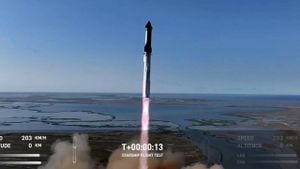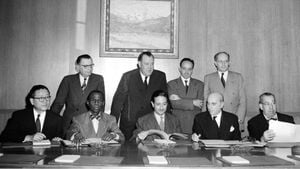Nelson Mandela University’s Faculty of Science stands as a beacon of hope and innovation, tackling global challenges head-on through education and research. With pressing issues like climate change, health crises, and poverty stifling progress around the globe, institutions like this are pivotal for devising effective solutions. Education is at the heart of these initiatives, fostering the development of new technologies and strategies to combat environmental threats, inequality, and healthcare shortages.
At the core of this remarkable effort is the Faculty of Science at Nelson Mandela University, which claims South Africa’s most diverse educational environment. This is truly inspired by the legacy of Nelson Mandela himself, aiming for education to translate directly to real-world impact. An exemplary project currently underway is the tackling of the Western Indian Ocean (WIO) Climate Crisis, targeting the urgent need for action as this region faces significant challenges from warming seas.
Global warming poses severe risks, particularly to the oceans, which absorbed about 90% of the excess heat generated by greenhouse gases since the 1970s. The past decade marks the warmest on record, and between 2012 and 2022, the average temperature of the western Indian Ocean has risen significantly. This impacts millions of people—an estimate suggests about 60 million across nine nations, including Kenya and Seychelles, rely on the ocean for their livelihoods, particularly small-scale fisheries tied to healthy coral reefs and mangroves. These ecosystems, unfortunately, are increasingly threatened.
Leading the charge against this crisis is Professor Michael Roberts, who heads research efforts predicting future changes and encouraging regional and international action to combat the WIO climate dilemma. His work is pivotal not only for ecological preservation but also for the communities relying on these resources.
The ethos of Nelson Mandela University encourages its students and faculty to challenge conventional thought, stepping outside comfort zones to consciously pursue innovative solutions. This spirit is evident across various projects within the Faculty of Science, including some groundbreaking initiatives. For example, researchers are exploring ways to transform pineapple waste—a byproduct from food processing—into effective water treatment solutions and examining alternative uses for waste tires.
“Strategy 2030” encapsulates the Faculty’s ambitious vision, which not only aligns with African priorities but also integrates the Ubuntu philosophy of communalism firmly within its curriculum and research framework. It places strong emphasis on cooperation to fulfill the UN’s Sustainable Development Goals along with elevational goals set forth by the African Union through the Africa Agenda 2063. The faculty seeks to respond to socio-economic challenges by creating programs addressing these issues, generating knowledge, and influencing global trends.
Integrative strategies at the faculty are anchored by expertise drawn from several leaders, including Professor Janine Adams, who directs the Institute for Coastal and Marine Research. She is concentrating on the conservation and management of estuarine systems, which are not just rich biodiversities but also play roles in local economies and flood management strategies. Through her research, she aims to shape policies protecting these biodiverse areas, advancing environmental awareness and support for local tourism.
Another significant focus includes the quest for local drug manufacturing capabilities. The COVID-19 pandemic underscored the stark need for South Africa to produce its own healthcare essentials. Professor Paul Watts is spearheading research employing flow chemistry techniques to manufacture active pharmaceutical ingredients domestically. His efforts could potentially reduce the cost of these medicines by up to 30%, making them considerably more accessible for the population.
Students at Nelson Mandela University benefit not only from these innovative projects but also from state-of-the-art research facilities. The facilities like the Downstream Chemicals Technology Station and the Centre for High Resolution Transmission Electron Microscopy provide invaluable hands-on experience, equipping graduates with the necessary skills for future employment through practical engagement with real-world scientific challenges.
This dynamic learning environment is reflected by promising students like Sandiso Ngwenya, who is tackling challenges associated with synthesizing Coumarin compounds—crucial components for pharmaceuticals—using continuous flow chemistry. This advanced method allows for streamlined chemical processes, yielding higher purity and efficiency, showcasing the caliber of education and innovation happening at Mandela University.
Education here is not merely about acquiring knowledge; it’s interwoven with practical applications and societal benefits. For aspiring students, the Faculty offers numerous postgraduate programs across various disciplines such as geography, biochemistry, zoology, and more—all aimed at preparing graduates to make meaningful contributions to the challenges facing the country and continent.
Nelson Mandela University is committed to fostering creativity, innovative thinking, and practical skills within its students, preparing them to enter fields where they can enact change and contribute to the community. With such significant projects and research efforts underway, the Faculty of Science not only honors Mandela's legacy but also shapes the future of science and society.
To learn more about how you can be part of this transformative experience, explore the Faculty of Science at Nelson Mandela University. Your opportunity to engage with groundbreaking research and innovation awaits, appealing to those eager to make their mark on the world.
Through the combined efforts of talented researchers, dedicated faculty, and inspired students, Nelson Mandela University’s Faculty of Science remains laser-focused on addressing contemporary global challenges, offering hope and practical solutions for the future.



